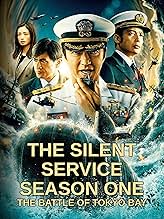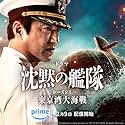Verfolgt die unvorhersehbaren Handlungen von Kaieda Shiro in Japans erstem Atom-U-Boot, während er versucht, seine ideale Welt zu verwirklichen.Verfolgt die unvorhersehbaren Handlungen von Kaieda Shiro in Japans erstem Atom-U-Boot, während er versucht, seine ideale Welt zu verwirklichen.Verfolgt die unvorhersehbaren Handlungen von Kaieda Shiro in Japans erstem Atom-U-Boot, während er versucht, seine ideale Welt zu verwirklichen.
Empfohlene Bewertungen
Wrong USN/JMSDF uniforms, wrong shirts, wrong insignia, wrong hair length, wrong rank structure, far too many women in positions of power, disrespectful JMSDF enlisted personnel, wrong submarine, wrong plot, wrong writing, wrong physics, wrong drydock, wrong, wrong.
There are fine Japanese and American actors - fine producers - fine set builders and costume professionals - why were none of them hired for this disaster? Where was the technical advisor - wait - there is no way there was a technical advisor.
How is this production of wrong even possible.
Never allow any of these people to work in entertainment - ever again!
There are fine Japanese and American actors - fine producers - fine set builders and costume professionals - why were none of them hired for this disaster? Where was the technical advisor - wait - there is no way there was a technical advisor.
How is this production of wrong even possible.
Never allow any of these people to work in entertainment - ever again!
Confusing and frequently slow made watching the series difficult to finish. 8 episodes took me maybe 12-15 different viewing times due to the pacing.
AFAIK, it was originally a manga series with an anime version and now this. Don't know anything about Japanese manga, anime, etc, but this series appears to be close translation of a successful comic book source with JV screenwriters without any military consultants, a decent budget, making visuals a priority over substance, character interaction, and logical plot development.
Who would really enjoy this movie? Maybe 10-12 year old boys if they skip most of the political stuff. Americans were obviously not the target audience given the preponderance of stupid and simple Americans.
5 stars for some interesting story ideas, special effects, and many nice visuals. If you demand realism, skip this movie.
AFAIK, it was originally a manga series with an anime version and now this. Don't know anything about Japanese manga, anime, etc, but this series appears to be close translation of a successful comic book source with JV screenwriters without any military consultants, a decent budget, making visuals a priority over substance, character interaction, and logical plot development.
Who would really enjoy this movie? Maybe 10-12 year old boys if they skip most of the political stuff. Americans were obviously not the target audience given the preponderance of stupid and simple Americans.
5 stars for some interesting story ideas, special effects, and many nice visuals. If you demand realism, skip this movie.
It is interesting as it pits the US against Japan. Japanese Captain Kaieda is brilliant in navigation and tactics and has managed to steal a top secret US-Japanese nuclear submarine, the Sea Bat, and has declared he is the leader of the independent nation of Yamato. That raises concerns for Japan, and also irritates the Americans. The 7th Fleet is mobilized to track down the submarine. A Japanese Captain, Kukamachi is sent to intercept the Sea Bat in a diesel powered submarine. It becomes an interesting game of cat and mouse, and Kaieda uses some very interesting tactics. Episode 5 is perhaps the most important and also shows the flaws in the series. The US considers Kaieda a terrorist, and naturally America never negotiates with a terrorist. So the Sea Bat is to be hunted down and destroyed, which is not what Japan wants to happen, and this results in a rift, and also Presidential testosterone is on display, and the US comes across as a bully. As part of the effort to track down and destroy the Sea Bat, the 3rd fleet also joins forces and the Sea Bat easily sinks one of the US nuclear carriers. The CGI isn't terrible, but they have both US carriers identical, down to the arrangement of aircraft on the decks. That seems sloppy. Also, as they follow ships and submarines by sonar, the sonar scope shows identifications of the ships like would be seen on air control radar at an airport. That seems unlikely. It seems to be set up for another season.
"The Silent Service" (2023) emerges as a bold critique of global power dynamics, cleverly subverting audience expectations by transforming its narrative from a straightforward military drama into a powerful commentary on international relations and justice.
The series' most daring move is its gradual revelation that the United States takes on the role of Ahab - not in pursuit of justice, but consumed by the need to maintain dominance. Unlike Melville's tale, here the hunter becomes the true monster, with the pursuit of the Kaieda serving as a mirror reflecting the darker aspects of superpower politics.
What sets "The Silent Service" apart is its unflinching examination of how military might shapes international justice. The series bravely portrays how a superpower can act as a global bully, where:
The submarine warfare elements serve a deeper purpose than mere military thrills. Each tactical maneuver and strategic decision becomes a metaphor for how nations must navigate the treacherous waters of international politics, where the strong make the rules and the rest must show extraordinary skill and courage to maintain their autonomy.
The series explores several provocative ideas:
The underwater setting becomes particularly poignant - in the depths, where sunlight barely reaches, traditional notions of right and wrong become as murky as the waters themselves. The pressure of depth mirrors the pressure of standing against a global superpower.
"The Silent Service" demonstrates remarkable courage in challenging prevalent narratives about global power dynamics. While other military dramas might glorify superpower dominance, this series dares to question the relationship between might and right, making it not just entertainment but a vital commentary on contemporary international relations.
The series' most daring move is its gradual revelation that the United States takes on the role of Ahab - not in pursuit of justice, but consumed by the need to maintain dominance. Unlike Melville's tale, here the hunter becomes the true monster, with the pursuit of the Kaieda serving as a mirror reflecting the darker aspects of superpower politics.
What sets "The Silent Service" apart is its unflinching examination of how military might shapes international justice. The series bravely portrays how a superpower can act as a global bully, where:
- Military superiority is confused with moral authority
- International law becomes flexible for the powerful
- Smaller nations must navigate carefully around superpower interests
- "Justice" often means whatever serves the strongest party
The submarine warfare elements serve a deeper purpose than mere military thrills. Each tactical maneuver and strategic decision becomes a metaphor for how nations must navigate the treacherous waters of international politics, where the strong make the rules and the rest must show extraordinary skill and courage to maintain their autonomy.
The series explores several provocative ideas:
- How military supremacy can corrupt notions of justice
- The thin line between maintaining order and enforcing hegemony
- The courage required to stand against overwhelming force
- The moral complexity of defying superpower authority
The underwater setting becomes particularly poignant - in the depths, where sunlight barely reaches, traditional notions of right and wrong become as murky as the waters themselves. The pressure of depth mirrors the pressure of standing against a global superpower.
"The Silent Service" demonstrates remarkable courage in challenging prevalent narratives about global power dynamics. While other military dramas might glorify superpower dominance, this series dares to question the relationship between might and right, making it not just entertainment but a vital commentary on contemporary international relations.
Forget the 1 star jingoistic reviews of this Japanese production. Yes, it moves slowly and deliberately. Yes, the details about uniforms etc may not be as exact as some viewers may demand. But for me the story is the thing.
The big bonus is Takao Osawa, the smiling buddha general of the Kingdom series of movies. His calm but decisive nature provides the bedrock of this series.
And yes, it could have been more disciplined in its editing but that's nothing new for streaming movies and TV shows these days. A little bit of patience pays off here big time. Stick with it. The rewards, while not spectacular, are worth it.
The big bonus is Takao Osawa, the smiling buddha general of the Kingdom series of movies. His calm but decisive nature provides the bedrock of this series.
And yes, it could have been more disciplined in its editing but that's nothing new for streaming movies and TV shows these days. A little bit of patience pays off here big time. Stick with it. The rewards, while not spectacular, are worth it.
Wusstest du schon
- VerbindungenRemake of Chinmoku no Kantai (1995)
Top-Auswahl
Melde dich zum Bewerten an und greife auf die Watchlist für personalisierte Empfehlungen zu.
- How long is The Silent Service?Powered by Alexa
Details
Box Office
- Weltweiter Bruttoertrag
- 7.836.539 $
- Laufzeit1 Stunde 53 Minuten
- Farbe
Zu dieser Seite beitragen
Bearbeitung vorschlagen oder fehlenden Inhalt hinzufügen


































